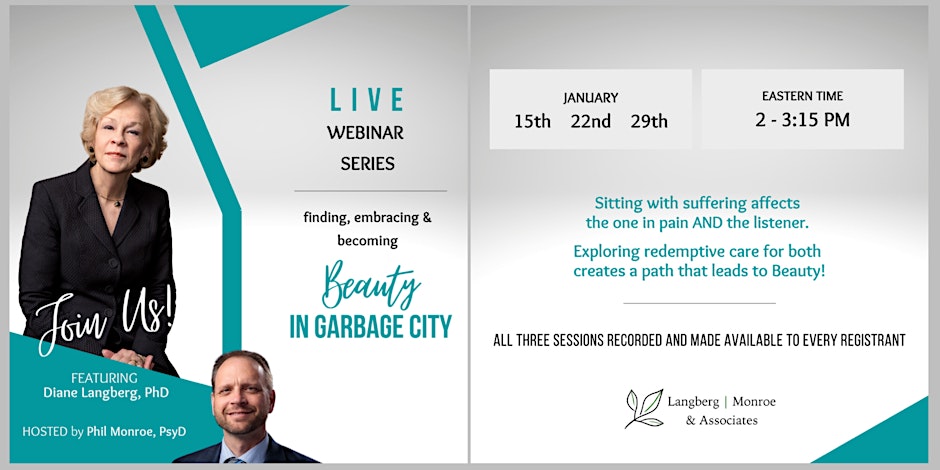So, now that we have identified some barriers to recovery (myths and red flag moves by helpers) and noted essential items you need for this journey—like compassion and curiosity, let’s conclude this series by exploring how to choose a therapist and a model.
It can feel impossible to find a quality therapist and downright overwhelming to choose a particular model of trauma care. If you have started to look you probably began first to explore credentials and general styles of therapy (models).
Do you choose Christian or biblical or secular? How much does licensing and credentials matter?
Which model? CBT, TF-CBT, DBT, PE, EMDR, Tapping, CPT, Brain spotting, NET, PFA, Debriefing, and somatic psychotherapy? Neurofeedback? IFS?
Medications? Ketamine? Transcranial magnetic stimulation?
Or maybe skip the therapy altogether and focus on yoga, mindfulness, meditation, art, or acupressure?
Feeling overwhelmed yet?
If you have been looking for very long, you probably heard someone sing the praises of one of these types of therapists or models over others and noted it to be a miraculous cure for them. And just as likely you have heard, “that didn’t work for me.”
Cutting through the fog
Several of the models listed have some scientific support. And some others have a lot of hype and anecdotes but little in the way of actual substantiated research. Randomized control trials, the gold standard of research, attempt to look past correlational data to determine if a positive result can be attributed to the intervention used. Sometimes we learn that a particular model is effective even while we do not fully understand why or what part of the model is having a positive impact. But, it should be noted that many RCTs tend to be small in sample size and somewhat limited in generalizability. In other words, it worked for the research group but until it is replicated many times with different populations, we won’t yet know if it works for most or for you or me.
One more frustrating part is that disciples of a model may suggest to you that an intervention they use is more successful than the researchers who developed and studied said model. We have this annoying habit of overestimating the value of the thing we have learned to do.
Pick your person first
So, don’t start with which model you should choose from. Yes, models and ideologies matter and influence the work done in session. But there is something more important to consider. It is…drum roll…the character and person of the counselor. Trust and connection in therapy has more to do with success than the model being used. We have already identified the characteristics of a good therapist in the last post:
- Goes at your pace.
- Is curious about what you need.
- Wants to learn what helps you more than tell you what you should do.
- Is aware of and adjusts when you are overwhelmed.
- Invites your pushback and doesn’t get defensive.
- Listens more than talks.
- Checks in to make sure you are talking about the things that matter to you the most.
- Does not criticize your faith journey.
If you have such a person now, ask yourself if you are holding back. Don’t judge yourself if you are, but ask what it might mean. It may mean there is something you are not ready to talk about. Good for you to know what you need. It may mean there is some bit of safety that still needs to be built in the session. It may mean something is off in the therapy. See if you can find a way to discuss this dynamic without talking about the thing you are holding back. How your therapist navigates this bit of information will tell you much about the safety and trust in the relationship.
But I don’t have this person yet, how do I find them?
I recommend you start by asking people who you trust, who they have heard does good work. Get firsthand reports whenever possible. You want to ask,
“Who would you go to or send your family member to if you knew they needed a good therapist? What makes them a good therapist?”
Once you locate someone who seems to fit the bill—experience…known to be a good listener…has credentials and training—you will still need to find out if this person is going to be right for YOU.
Once you get an appointment, interview them in that first session and keep in mind these questions as you progress in your therapy.
- What models/authors do you most likely follow?
- What are early signs that therapy is working? Signs that maybe something else is needed?
- What do therapy sessions look like? Hopefully, their answers include some form of:
- Grounding/calming. Before/during/after triggers in session and practiced at home. It should be tailored to your needs and flexible.
- Small exposure to trauma via your story—not rushed in the therapy process—with more grounding sandwiched around the exposure. This should be well-planned and short, and not a whole session focused on traumatic stories and triggers. The goal is not reliving trauma but remembering, lamenting, and then shifting weight to the present.
- Narrative or meaning focus (who am I? who is God? Was it my fault?). Exploring and grounding in new narratives This often comes later in therapy work.
- Grief work. Most therapies will have some exploration of grief and lament. Naming what was lost and what has been suffered is necessary for good healing.
- Finding and celebrating strengths and resilience. An important part of recovery is seeing where and how you have grown and developed new capacities.
But, what model should I be looking for?
I won’t be able to tell you what works for you. But use the following questions to determine what works for you now. It might be that you need one supportive therapy now and a different one later.
- Are you struggling with being on high alert all the time? Do you want to find something that helps you calm your body? Consider something that helps you practice calming and stabilizing your body. Somatic psychotherapies that follow work by Janina Fisher may be most appropriate for you.
- Are you a writer? Consider more narrative focused treatment like NET or CPT.
- Do you find yourself stuck in patterns of bad relationships and self-harming behaviors? Consider a DBT oriented group or therapist.
- Do you find yourself in a frozen state (vs flight/fight/fawn)? Consider something that is less exposure oriented. You may find that certain exposure-oriented interventions (CBT/EMDR/PE) are unhelpful in early phases. Similarly, if you have many traumas versus one, consider something that goes much more slowly and helps you stay connected to parts of yourself. You may find that someone who follows the work of Diane Langberg or Judith Herman is a better fit for you. Also, the work of IFS can help you make some safe room for exiled/shamed parts.
Concluding thought
The work of trauma recovery is slow, repetitive work. You learn something, then need to learn it again. You feel some growth, and then feel yourself slipping, especially when you hit anniversaries and reminders. Give yourself permission to keep trying old and new things.
The journey of recovery (whether in therapy or just waking up to another day) is an ongoing reminder that something has died. Maybe for you it is a relationship or trust or a body that didn’t bear the invisible wounds. You will grieve these things. Try to grieve without confusing grief with shame and guilt. You may have to relearn that grief does not mean shame.
Remember also that your journey will show you that you are still alive. You survived. Slow your breathing and feel your aliveness. Feel your aliveness—even the pain—telling you that you are here, and you reflect courage and beauty. Take note of the small things growing in and around you. These are the bits of beautiful creation that tell us you reflect God’s glory. You may not feel the beauty but consider that it is still true.
For further reading about the healing journey, consider reading “Wounded, I am More Awake.” You can read my thoughts on this book beginning here.



